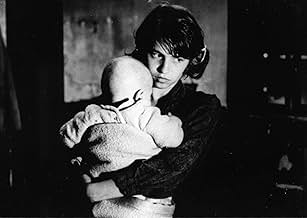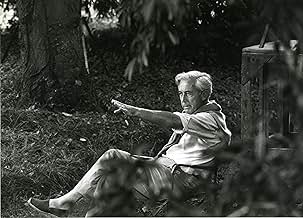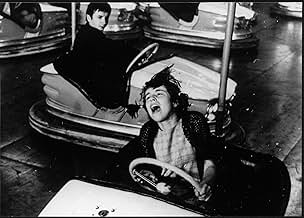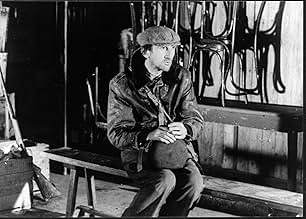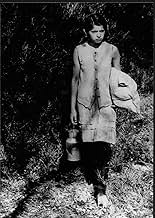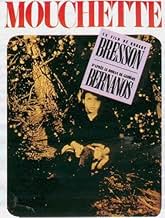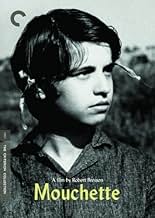CALIFICACIÓN DE IMDb
7.7/10
14 k
TU CALIFICACIÓN
Agrega una trama en tu idiomaA young girl living in the French countryside suffers constant indignities at the hand of alcoholism and her fellow man.A young girl living in the French countryside suffers constant indignities at the hand of alcoholism and her fellow man.A young girl living in the French countryside suffers constant indignities at the hand of alcoholism and her fellow man.
- Dirección
- Guionistas
- Elenco
- Premios
- 5 premios ganados y 1 nominación en total
- Dirección
- Guionistas
- Todo el elenco y el equipo
- Producción, taquilla y más en IMDbPro
Opiniones destacadas
Until now Robert Bresson has been one of those classic directors who have failed to connect with me. With Au Hasard Balthazar and Pickpocket, I've found his style over-simplified, bland and plodding. While Balthazar didn't work for me at all, Pickpocket had moments where it showed potential but then it was quickly squandered and taken in a different direction. Here with Mouchette, his style is finally working. It's a film utterly drenched in sorrow and pain. Through the protagonists' squirming and rebelling from her struggles, her actions are a catharsis from the frustrations of life and when she's punished for them, it digs deep. Although the storytelling techniques are similar to the films I didn't care much for, what elevates Mouchette is the passionate performances and the crisp photography. While I do regret that it's so brief, Mouchette is a brilliant portrayal of a truly tragic figure that faces the hardships and inevitable moral dilemmas of life. I'm very glad Bresson has warmed up to me as he's got many films I'm really looking forward to, such as A Man Escaped and Lancelot du Lac.
8/10
8/10
My Rating : 9/10
Bresson is heralded as an important filmmaker in world cinema. I absolutely love 'Mouchette' and it is a masterpiece of world cinema. It was on Tarkovsky's top 10 films list he made for Sight & Sound.
Bresson's other famous film Au Hasard Balthasar and Mouchette have common themes of abuse and negligence of the main characters. This film has the formal inevitability of tragedy, and is soaked through with a species of lyrical, desperate sadness. This quality, and the compelling aesthetic seriousness with which Bresson addresses his themes of suffering, compassion and the rural poor, are very remarkable indeed. Mouchette is a visionary, poetic film, fraught with elusive, unsettling meanings: a classic cinematic text.
Bresson is heralded as an important filmmaker in world cinema. I absolutely love 'Mouchette' and it is a masterpiece of world cinema. It was on Tarkovsky's top 10 films list he made for Sight & Sound.
Bresson's other famous film Au Hasard Balthasar and Mouchette have common themes of abuse and negligence of the main characters. This film has the formal inevitability of tragedy, and is soaked through with a species of lyrical, desperate sadness. This quality, and the compelling aesthetic seriousness with which Bresson addresses his themes of suffering, compassion and the rural poor, are very remarkable indeed. Mouchette is a visionary, poetic film, fraught with elusive, unsettling meanings: a classic cinematic text.
Never before has cinema been this simple and honest. No one makes films with more emotion than Bresson and no one puts less emotion in their films than he. I could cite so many Bressonian cliches and talk of his uniquely personal style which by 1967 was firmly established, especially since he had abandoned the voice-over he used in the 50s. I will point out his use of sound and approach to acting which remain so distinctive and by now so familiar. There is nothing in Mouchette that is new, especially after Balthazar, what remains is the story of Mouchette, told with the utter grace and passion that makes this film a masterpiece that transcends technique, even cinema itself, and makes most cinema look frivolous in the process.
Finally I must mention the films ending, which I rank with that of Balthazar as the most beautiful I have seen.
Finally I must mention the films ending, which I rank with that of Balthazar as the most beautiful I have seen.
After I watched Bresson's "Au Hasard Balthazar" a few years ago, I was advised by a friend to watch "Mouchette" next. I told him I wasn't particularly struck by the character development and the portrayal of humans and emotions in the former, and learned that I had the exact same problems with the latter.
The girl is amazing. Her justified rebellious behavior and her unique and authentic appearance really shine in this movie. Also, the photography in the film is very well done, as I would have dared to expect from Bresson. Technically, this movie certainly is very good.
However, the way people interact in this movie often doesn't make sense to me. And I know movies aren't obligated to be realistic, but this movie certainly has a lot of ingredients on board to make you believe it's trying to be realistic. It's not an absurd or surrealistic film where you won't have to expect to be able to completely understand emotions and social situations. The consequence is - to me at least - that my compassion doesn't know how to handle the situation. First something sad happens, and I get moved, but then there's weird silences or poetic expressions (not necessarily verbal) which don't fit the realistic context and interrupt the immersion if you ask me.
Another friend of mine with whom I discussed this topic mentioned a good point however: perhaps you should let go of the expectation to be moved emotionally. Doesn't the movie just try to display the story, possibly telling you to accept life for what it is without necessarily trying to move you? Well observed, it's possible. I still believe the movie could benefit strongly if it was more emotionally involving though.
I have had this discussion with a lot of people about several movies, and it seems nobody either understands or agrees with me on this subject. Therefore, I'm even more aware of how subjective this point of view is. Obviously, this movie isn't a classic for no reason and I'm sure it has plenty of qualities that let people appreciate it so much. Not entirely my cup of tea though.
The girl is amazing. Her justified rebellious behavior and her unique and authentic appearance really shine in this movie. Also, the photography in the film is very well done, as I would have dared to expect from Bresson. Technically, this movie certainly is very good.
However, the way people interact in this movie often doesn't make sense to me. And I know movies aren't obligated to be realistic, but this movie certainly has a lot of ingredients on board to make you believe it's trying to be realistic. It's not an absurd or surrealistic film where you won't have to expect to be able to completely understand emotions and social situations. The consequence is - to me at least - that my compassion doesn't know how to handle the situation. First something sad happens, and I get moved, but then there's weird silences or poetic expressions (not necessarily verbal) which don't fit the realistic context and interrupt the immersion if you ask me.
Another friend of mine with whom I discussed this topic mentioned a good point however: perhaps you should let go of the expectation to be moved emotionally. Doesn't the movie just try to display the story, possibly telling you to accept life for what it is without necessarily trying to move you? Well observed, it's possible. I still believe the movie could benefit strongly if it was more emotionally involving though.
I have had this discussion with a lot of people about several movies, and it seems nobody either understands or agrees with me on this subject. Therefore, I'm even more aware of how subjective this point of view is. Obviously, this movie isn't a classic for no reason and I'm sure it has plenty of qualities that let people appreciate it so much. Not entirely my cup of tea though.
Just like I remembered. The face of Nadine Nortier has not changed. The unbelievable "Mouchette" in this unforgettable Robert Bresson masterpiece. I hadn't seen the film since I was a teen ager. I saw it again last night and as if by magic it felt more contemporary today than it did then and then, let me tell you, it felt pretty real in its own rigorous lyrical style. What a shockingly wonderful effect a film like this could have on teen agers today. To stay with a character who takes us with nothing more than her naked truth through a landscape of absolute desolation. Her innocence intact, in spite of the outrage. Her ultimate act as breathtaking as anything we have ever seen on the screen, before or since. I tried to show the film to a group of twentysomethings, all of them walked away within the first fifteen minutes. All except one, a boy of 21, he had escaped Bosnia with his brother a few short years ago. As the film ended I looked at him. He was silent. He spoke without looking at me "can I see it again?" That's at the center of the experience that provides this film. "Mouchette" is meant for everyone, but it'll touch only some.
¿Sabías que…?
- TriviaIt was rumored for years that the trailer for this film was by Jean-Luc Godard, and he has recently confirmed this by programming it in a self-curated retrospective of his work. The trailer is virtually a miniature essay on (or subversion of) the film, jarringly inter-cutting excerpts from it with a written commentary that calls it "Christian and sadistic."
- Errores(at around 1 min) The canteen changes position after being dropped.
- ConexionesEdited into Bande-annonce de 'Mouchette' (1967)
- Bandas sonorasMagnificat
Written by Claudio Monteverdi
Performed by Les Chanteurs de St. Eustache
Conducted by R.P. Émile Martin
Selecciones populares
Inicia sesión para calificar y agrega a la lista de videos para obtener recomendaciones personalizadas
- How long is Mouchette?Con tecnología de Alexa
Detalles
- Tiempo de ejecución1 hora 21 minutos
- Color
- Mezcla de sonido
- Relación de aspecto
- 1.66 : 1
Contribuir a esta página
Sugiere una edición o agrega el contenido que falta

Principales brechas de datos
By what name was Mouchette (1967) officially released in India in English?
Responda
